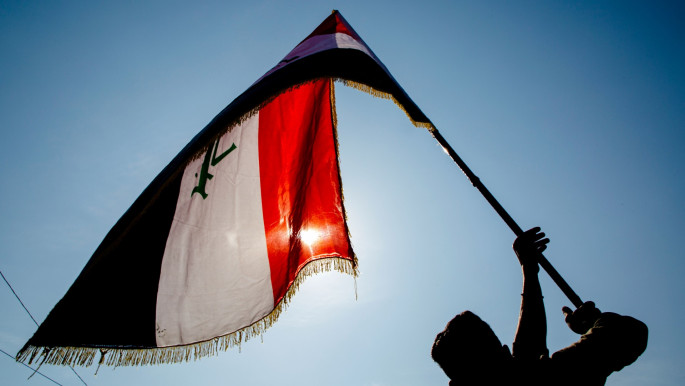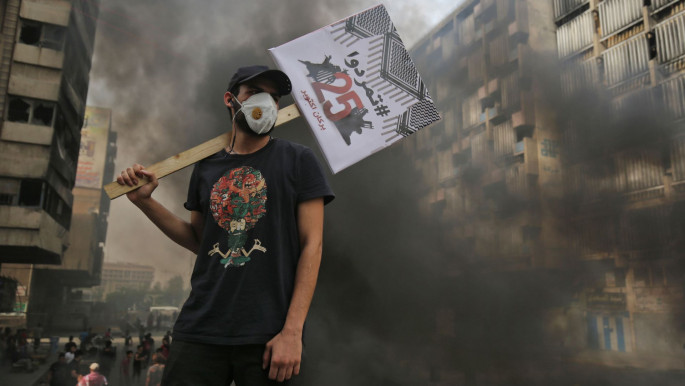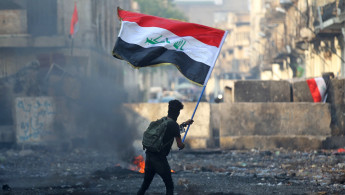'Old faces, new names': The disingenuous promise of early elections in Iraq
Around this demand a protest movement crystallised, forcing then-prime minister Adel Abdul Mahdi to resign.
His successor, ex-intelligence chief, Mustafa al-Kadhimi, is seeking a truce, promising early elections scheduled for October 2021 in the hope of quenching protesters' demands.
Kadhimi's promise reads as an admission that the system under his rule is "bent, but not broken," vowing to rescue a structure caving under the weight of 15 years of inaction and poor governance.
It will be a tough sell. Tolerance towards the status quo and commonplace corruption has worn thin. The promise hinges on his ability to prorogue parliament, as the constitution demands, and cross-party consensus.
This is not without risk. Early elections would require parliamentarians to surrender their seats, but the glitter of power may blind their judgment on whether to stand with or against Kadhimi.
Kadhimi's predecessor, Mahdi, made similar promises, but failed to secure full-spectrum political support to prorogue parliament. At the time, bubbling public anger (against misrule) and Mahdi's abandonment by US and Iranian sponsors, reduced his options to nil. The head of the system was replaced, its body unchanged.
 |
Iraqi citizens and their government have been facing off since protesters demanded wholesale regime change in October 2019 |  |
Many are intrigued to see how Kadhimi will fare against the same challenges, alongside the mammoth task of preventing an upswell of violence which has typically accompanied elections in Iraq.
Analysts have also pointed to logistical challenges, including the roll out of a biometric voter system and whether it can alleviate double voting concerns.
 |
|
| Read more: Why Iraq's protest movement fears being co-opted by political elites |
Another demand that Kadhimi is yet to convince the masses of is representation for internally displaced communities at the ballot box. At a time when the government has forcibly closed camps offering displaced communities temporary yet essential housing, participation appears bleak.
Iraq's consensus problem will create further roadblocks. Leading contenders in the race, including Sairoun, Fatah, State of Law, Nasr, and al-Hikma, have given Kadhimi's plan a ceremonial nod of approval.
But behind rhetorical smokescreens is a climate of high competition between ruling parties, and their affiliated militias, meaning that seats will be fiercely fought over.
Parties also stand opposed to the latest December 2020 election law which replaced the proportional representation system with multi-district voting to encourage smaller and independent parties.
Unified lists will be banned, meaning that parties can no longer enter the race as separate entities unified under one banner - as was the case with the Sadrist-Communist 'Sairoun alliance'.
 |
Political and ethnic fiefdoms outside of state control, and a militia presence, make the act of voting a huge gamble for citizens |  |
This vote-sharing model is intended to reduce the chance for any one candidate to secure a majority. Its implementation remains questionable. Iraq's 18 provinces will be divided into 83 districts, each allocated 3-5 seats.
Eradaa movement leader and former MP, Hanan al Fatlaw, who is teaming up with Nouri al-Maliki's coalition for this year's vote, believes that implementing the law "will be a "logistical nightmare." In an interview with al-Sumaria news, Fatlawi criticised the redrawing of district lines, warning it would result in polarisation and a reduced public appetite to vote. "Laws that unite the country are what Iraq needs at this moment not further splintering."
Two days before the registration period for candidacies and political coalitions expired, it was renewed by the Iraqi High Electoral Commission (IHEC) on 25 February 2021. It is unclear whether further delays and postponements lie ahead.
Legislation itself cannot guarantee electoral integrity and ensure elections are held on time. Political and ethnic fiefdoms, outside of state control, and militia presence, make the act of voting a huge gamble for citizens, without protection.
 |
|
| Read more: Iraq's reign of fear: Inside the violent power struggle killing Basra's activists |
It is unclear how the prime minister will prohibit armed groups from determining the rules of the electoral game inside territories they control.
Relentless assaults by state forces on unarmed protesters in Nasiriyah have exposed Kadhimi's inability to maintain security, as well as excessive violence by security forces against unarmed masses.
Nasiriyah, dubbed the heart of Iraq's protest movement, has been agitating vociferously for change, costing the province hundreds of lives.
These (not entirely new) risks will continue to undermine voter turnout. Equally discouraging is the latest plot twist; the emergence of a new crop of candidates claiming to represent the protest movement.
 |
The emergence of 'protest parties' not only represents the ruling government's last gasp for air, it also exposes in the minds of demonstrators a disingenuous promise for real change |  |
Out of 400 applicants, IHEC granted licenses to 200 newly registered parties. Parties are noticeably young, and fashionably self-branded as vanguards of the Protest Movement, but widely perceived as a government-sponsored rebranding exercise to legitimise the promise that elections "will be democratic."
Imtidad, Waey, The National House, October 25, the Iraqi Tent, are a few of the prominent names. Their shady and undisclosed connections to household political parties from Ammar al-Hakim's Hikma to Nouri al-Maliki Al-Dawa, is no secret.
 |
|
| Read more: 'They are still trying to silence us': One year on, Iraq's youth rise again |
"Old faces, new names" is a frequently observed critique across Iraqi networking sites. The emergence of "protest parties'' not only represents the ruling government's last gasp for air, it also exposes in the minds of demonstrators a disingenuous promise for real change in Iraqi politics.
IHEC sponsorship, or supervision by the United Nations Assistance Mission for Iraq (UNAMI), will hardly inspire voter confidence either.
Since October 2019, IHEC's southern offices have been torched by protesters as potent symbols of corruption. Well-documented instances of ballot box fraud and collusion with Baghdad has discredited the electoral watchdog in the eyes of the population.
The youth, or rather the "protest movement" card Kadhimi is playing, is intended to smother the demand for 'Isqat al Nezam' which in Arabic translates into "termination of the system" not its "recalibration."
Politically astute Iraqis recognise that cosmetic reforms and sloganeering serve the ruling cartel. They are no longer waiting with bated breath for changes that Kadhimi and others before him have had seventeen years to follow through on. Time is not on Kadhimi's side, insistent that early elections, against these odds, will go ahead.
Nazli Tarzi is a freelance British-Iraqi journalist specialising in Middle East politics, with a particular interest in Iraqi affairs.



